Mechanical Engineering Series
Frederick F. Ling
Editor-in-Chief
�
Mechanical Engineering Series
J. Angeles, Fundamentals of Robotic Mechanical Systems:
Theory, Methods, and Algorithms, 2nd ed.
P. Basu, C. Kefa, and L. Jestin, Boilers and Burners: Design and Theory
J.M. Berthelot, Composite Materials:
Mechanical Behavior and Structural Analysis
I.J. Busch-Vishniac, Electromechanical Sensors and Actuators
J. Chakrabarty, Applied Plasticity
K.K. Choi and N.H. Kim, Structural Sensitivity Analysis and Optimization 1:
Linear Systems
K.K. Choi and N.H. Kim, Structural Sensitivity Analysis and Optimization 2:
Nonlinear Systems and Applications
G. Chryssolouris, Laser Machining: Theory and Practice
V.N. Constantinescu, Laminar Viscous Flow
G.A. Costello, Theory of Wire Rope, 2nd Ed.
K. Czolczynski, Rotordynamics of Gas-Lubricated Journal Bearing Systems
M.S. Darlow, Balancing of High-Speed Machinery
W. R. DeVries, Analysis of Material Removal Processes
J.F. Doyle, Nonlinear Analysis of Thin-Walled Structures: Statics,
Dynamics, and Stability
J.F. Doyle, Wave Propagation in Structures:
Spectral Analysis Using Fast Discrete Fourier Transforms, 2nd ed.
P.A. Engel, Structural Analysis of Printed Circuit Board Systems
A.C. Fischer-Cripps, Introduction to Contact Mechanics
A.C. Fischer-Cripps, Nanoindentations, 2nd ed.
J. García de Jalón and E. Bayo, Kinematic and Dynamic Simulation of
Multibody Systems: The Real-Time Challenge
W.K. Gawronski, Advanced Structural Dynamics and Active Control of
Structures
W.K. Gawronski, Dynamics and Control of Structures: A Modal Approach
(continued after index)
�
Rajesh Rajamani
Vehicle Dynamics and
Control
a - Springer
�
Rajesh Rajamani
University of Minnesota, USA
Editor-in-Chief
Frederick F. Ling
Earnest F. Gloyna Regents Chair Emeritus in Engineering
Department of Mechanical Engineering
The University of Texas at Austin
Austin, TX 78712-1063, USA
and
Distinguished William Howard Hart
Professor Emeritus
Department of Mechanical Engineering,
Aeronautical Engineering and Mechanics
Rensselaer Polytechnic Institute
Troy, NY 12180-3590, USA
Vehicle Dynamics and Control by Rajesh Rajamani
ISBN 0-387-26396-9
ISBN 9780387263960
e-ISBN 0-387-28823-6
Printed on acid-free paper.
O 2006 Rajesh Rajamani
All rights reserved. This work may not be translated or copied in whole or in part without
the written permission of the publisher (Springer Science+Business Media, Inc., 233 Spring
Street, New York, NY 10013, USA), except for brief excerpts in connection with reviews or
scholarly analysis. Use in connection with any form of information storage and retrieval,
electronic adaptation, computer software, or by similar or dissimilar methodology now
known or hereafter developed is forbidden.
The use in this publication of trade names, trademarks, service marks and similar terms,
even if they are not identified as such, is not to be taken as an expression of opinion as to
whether or not they are subject to proprietary rights.
Printed in the United States of America.
SPIN 11012085
�
For Priya
�
Mechanical Engineering Series
Frederick F. Ling
Editor-in-Chief
The Mechanical Engineering Series features graduate texts and research monographs to
address the need for information in contemporary mechanical engineering, including
areas of concentration of applied mechanics, biomechanics, computational mechanics,
dynamical systems and control, energetics, mechanics of materials, processing, produc-
tion systems, thermal science, and tribology.
Advisory BoardBeries Editors
Applied Mechanics
Biomechanics
Computational Mechanics
Dynamic Systems and ControU
Mechatronics
Energetics
Mechanics of Materials
Processing
Production Systems
Thermal Science
Tribology
F.A. Leckie
University of California,
Santa Barbara
D. Gross
Technical University of Darmstadt
V.C. Mow
Columbia University
H.T. Yang
University of California,
Santa Barbara
D. Bryant
University of Texas at Austin
J.R. Welty
University of Oregon, Eugene
I. Finnie
University of California, Berkeley
K.K. Wang
Cornell University
G.-A. Klutke
Texas A&M University
A.E. Bergles
Rensselaer Polytechnic Institute
W.O. Winer
Georgia Institute of Technology
�
Series Preface
Mechanical engineering, and engineering discipline born of the needs of the indus-
trial revolution, is once again asked to do its substantial share in the call for indus-
trial renewal. The general call is urgent as we face profound issues of productivity
and competitiveness that require engineering solutions, among others. The Me-
chanical Engineering Series is a series featuring graduate texts and research mono-
graphs intended to address the need for information in contemporary areas of me-
chanical engineering.
The series is conceived as a comprehensive one that covers a broad range of
concentrations important to mechanical engineering graduate education and re-
search. We are fortunate to have a distinguished roster of consulting editors, each
an expert in one of the areas of concentration. The names of the consulting editors
are listed on page vi of this volume. The areas of concentration are applied me-
chanics, biomechanics, computational mechanics, dynamic systems and control,
energetics, mechanics of materials, processing, thermal science, and tribology.
�
As a research advisor to graduate students working on automotive
projects, I have frequently felt the need for a textbook that summarizes
common vehicle control systems and the dynamic models used in the
development of these control systems. While a few different textbooks on
ground vehicle dynamics are already available in the market, they do not
satisfy all the needs of a control systems engineer. A controls engineer
needs models that are both simple enough to use for control system design
but at the same time rich enough to capture all the essential features of the
dynamics. This book attempts to present such models and actual automotive
control systems from literature developed using these models.
The control system topics covered in the book include cruise control,
adaptive cruise control, anti-lock brake systems, automated lane keeping,
automated highway systems, yaw stability control, engine control, passive,
active and semi-active suspensions, tire models and tire-road friction
estimation. A special effort has been made to explain the several different
tire models commonly used in literature and to interpret them physically.
As the worldwide use of automobiles increases rapidly, it has become
ever more important to develop vehicles that optimize the use of highway
and fuel resources, provide safe and comfortable transportation and at the
same time have minimal impact on the environment. To meet these diverse
and often conflicting requirements, automobiles are increasingly relying on
electromechanical systems that employ sensors, actuators and feedback
control. It is hoped that this textbook will serve as a useful resource to
researchers who work on the development of such control systems, both in
�
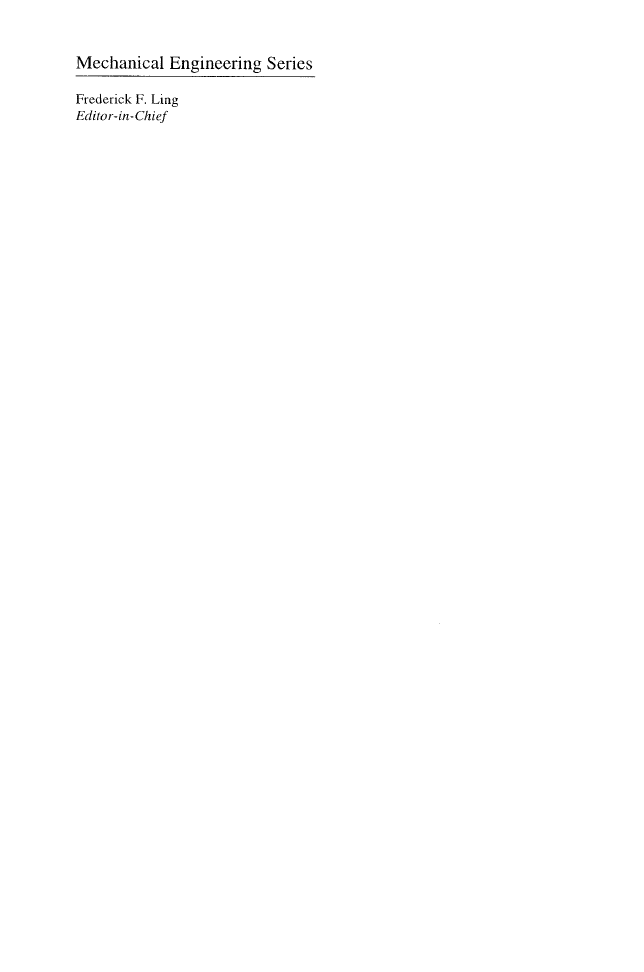
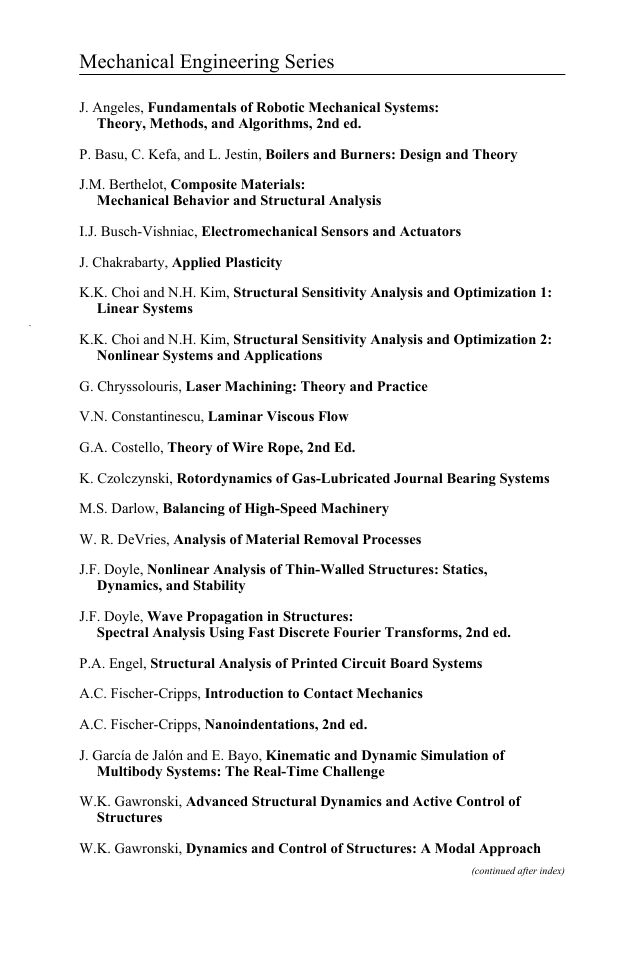
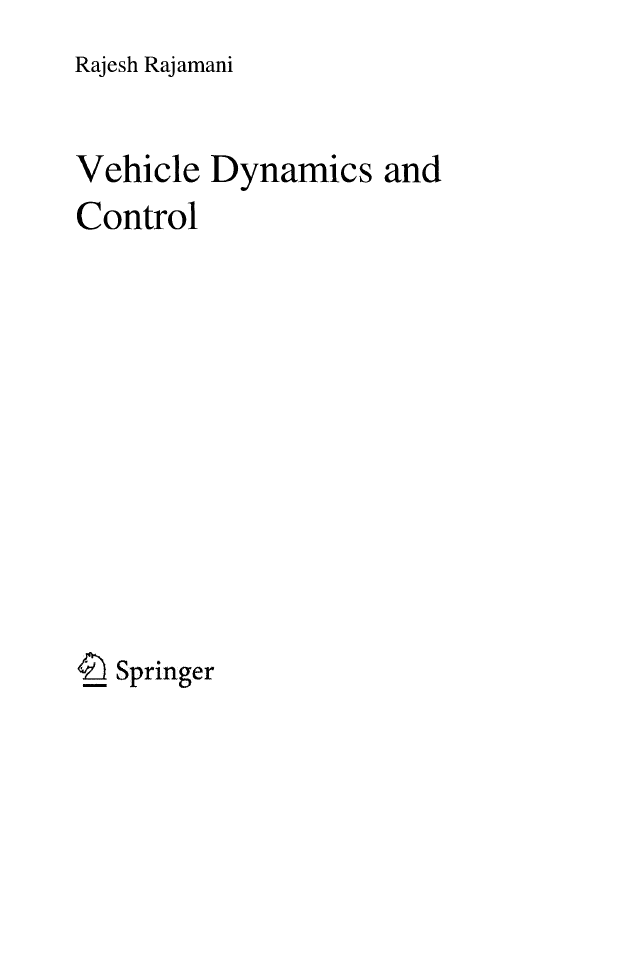
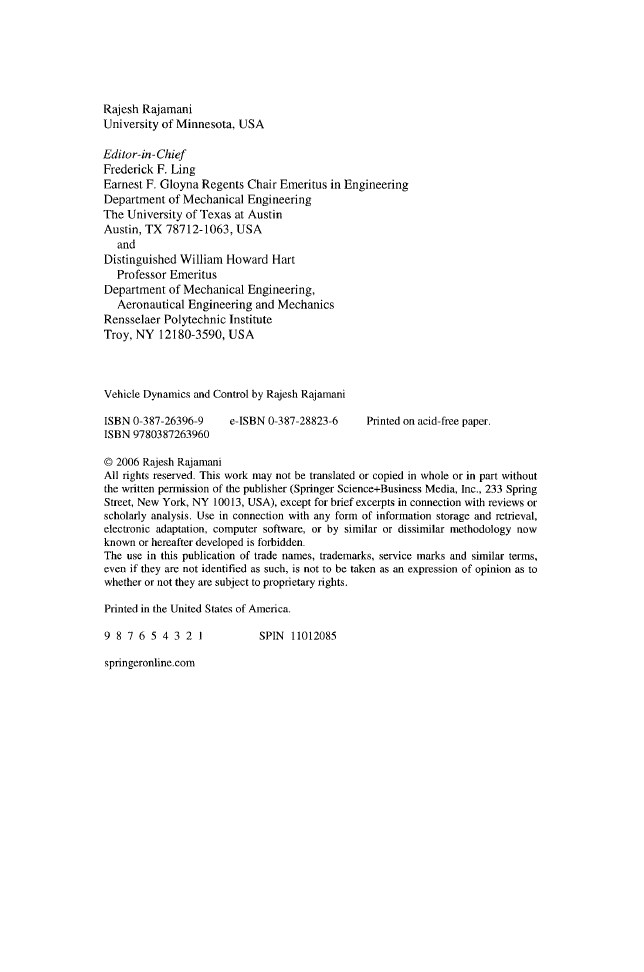

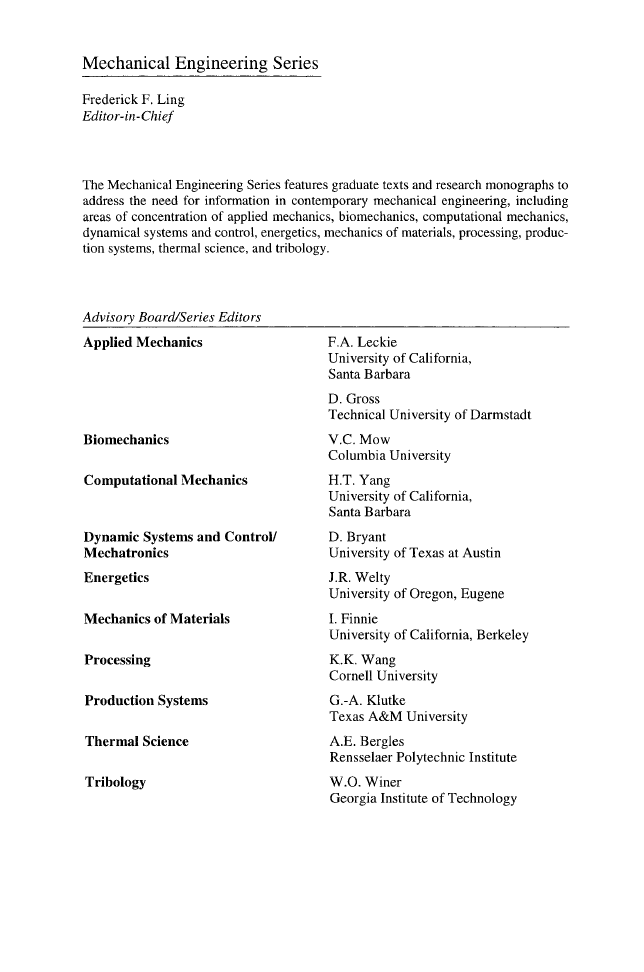
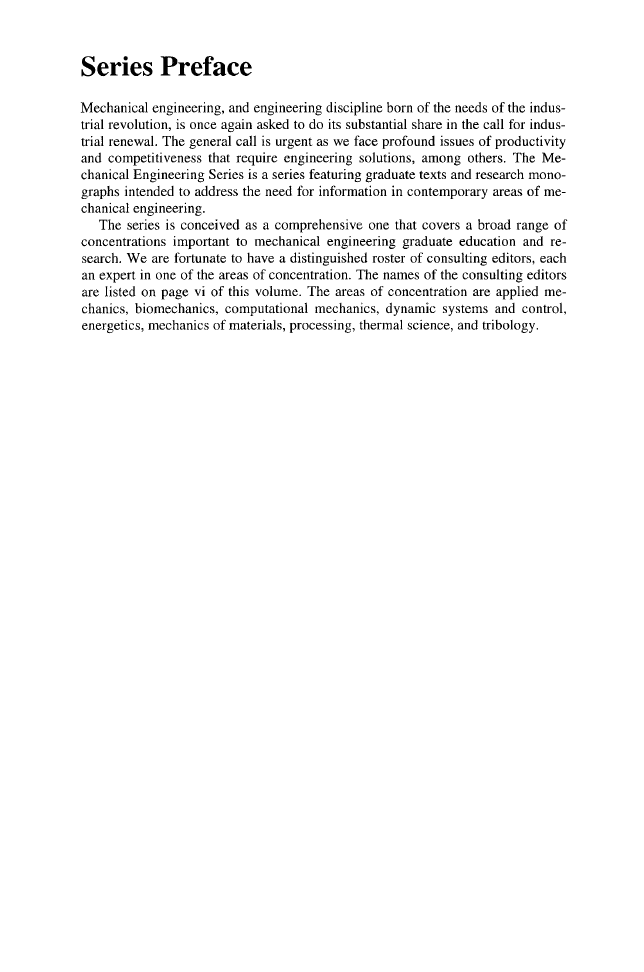
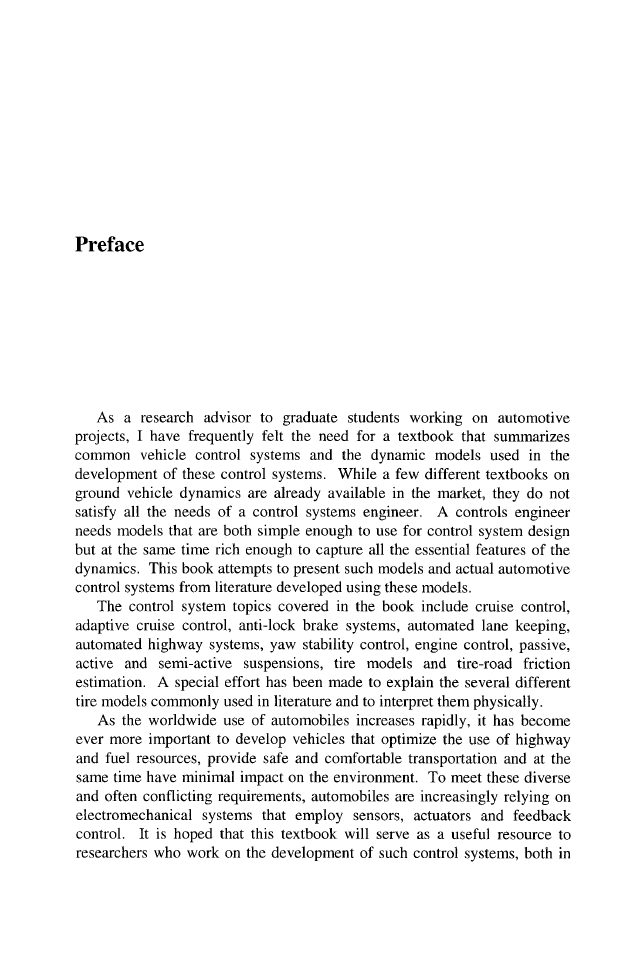








 2023年江西萍乡中考道德与法治真题及答案.doc
2023年江西萍乡中考道德与法治真题及答案.doc 2012年重庆南川中考生物真题及答案.doc
2012年重庆南川中考生物真题及答案.doc 2013年江西师范大学地理学综合及文艺理论基础考研真题.doc
2013年江西师范大学地理学综合及文艺理论基础考研真题.doc 2020年四川甘孜小升初语文真题及答案I卷.doc
2020年四川甘孜小升初语文真题及答案I卷.doc 2020年注册岩土工程师专业基础考试真题及答案.doc
2020年注册岩土工程师专业基础考试真题及答案.doc 2023-2024学年福建省厦门市九年级上学期数学月考试题及答案.doc
2023-2024学年福建省厦门市九年级上学期数学月考试题及答案.doc 2021-2022学年辽宁省沈阳市大东区九年级上学期语文期末试题及答案.doc
2021-2022学年辽宁省沈阳市大东区九年级上学期语文期末试题及答案.doc 2022-2023学年北京东城区初三第一学期物理期末试卷及答案.doc
2022-2023学年北京东城区初三第一学期物理期末试卷及答案.doc 2018上半年江西教师资格初中地理学科知识与教学能力真题及答案.doc
2018上半年江西教师资格初中地理学科知识与教学能力真题及答案.doc 2012年河北国家公务员申论考试真题及答案-省级.doc
2012年河北国家公务员申论考试真题及答案-省级.doc 2020-2021学年江苏省扬州市江都区邵樊片九年级上学期数学第一次质量检测试题及答案.doc
2020-2021学年江苏省扬州市江都区邵樊片九年级上学期数学第一次质量检测试题及答案.doc 2022下半年黑龙江教师资格证中学综合素质真题及答案.doc
2022下半年黑龙江教师资格证中学综合素质真题及答案.doc